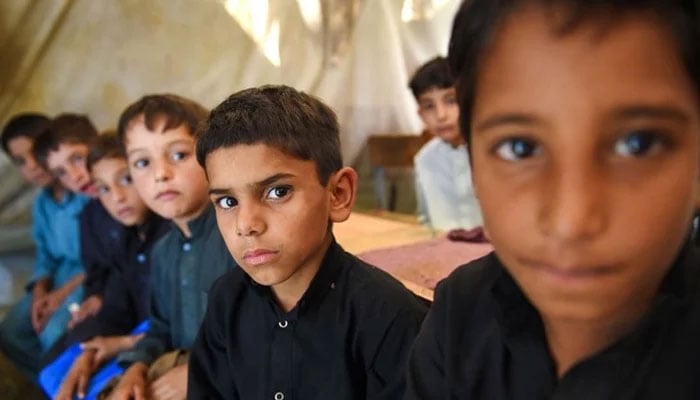A tale of neglect
In a country defined by the chronic neglect of its people, the province of Balochistan still manages to stand out. It has arguably borne the brunt of our ruling elite’s apathetic attitude towards the challenges faced by the people and its residents have been continuously punished for having the temerity to air their legitimate grievances.
A staggering 71.2 per cent of its people live in multi-dimensional poverty according to the UNDP and its total headcount for multi-dimensional poverty is the second highest of all the provinces in the country despite it having the fewest number of people.
Poverty is a condition that much of Pakistan’s poor are born into and remain in for the rest of their lives and much of this is down to our failed education system. Education is arguably the only means of escape from poverty in today’s world and it is an escape that the children of Balochistan are being denied, as they are many of their other rights. According to Balochistan’s caretaker Education Minister Abdul Qadir Bakhsh Baloc,h an acute shortage of teachers has forced the province to shut down around 3500 schools over the past two months alone. The caretaker education minister blames “political and departmental constraints” for the province’s inability to recruit any teachers since 2019, while 300 teachers are retiring every month. Of the 12,000 primary schools in Balochistan that are open, an estimated 50 per cent have only one teacher. And it is not just teachers that Balochistan’s schools are short on; there is also a critical shortage of infrastructure. The caretaker education minister has also been reported to have said that 5,500 schools were destroyed in the province by last year’s floods and that only 50 of them have been repaired so far. The damning statistics do not end here. Around 1,964 schools in the province have no building; 11,000 have no electricity; 10,000 have no water; and 1,800 do not have washroom facilities.
It is thus of little surprise that an estimated 800,000 children of school-going age in Balochistan are not in school. Of those lucky enough to have a school, their needs as students and as human beings are likely to go underserved, judging by the state of even the functioning schools in the province. Students deprived of not just sufficient teachers, but even the most basic amenities are unlikely to be able to realize their full potential. But it remains to be seen whether the people in charge of education in Balochistan, and the country as a whole, care about any of this. Will they act to redress the depressing facts shared by the caretaker provincial education minister? The lack of anything resembling a proper recovery and rehabilitation effort for the Balochistan schools damaged by the 2022 floods indicates otherwise. However, the price for this chronic neglect will not be paid for by the poor alone. As the grievances of the people of Balochistan continue to mount it will fuel more instability of the sort that has undermined Pakistan over the past few years. Nor does entrenched underdevelopment bode well for the nation’s economy. Ultimately, the country is only as strong as its weakest link.
-
 King Charles, Princess Anne, Prince Edward Still Shield Andrew From Police
King Charles, Princess Anne, Prince Edward Still Shield Andrew From Police -
 US Set To Block Chinese Software From Smart And Connected Cars
US Set To Block Chinese Software From Smart And Connected Cars -
 Carmen Electra Says THIS Taught Her Romance
Carmen Electra Says THIS Taught Her Romance -
 Leonardo DiCaprio's Co-star Reflects On His Viral Moment At Golden Globes
Leonardo DiCaprio's Co-star Reflects On His Viral Moment At Golden Globes -
 SpaceX Pivots From Mars Plans To Prioritize 2027 Moon Landing
SpaceX Pivots From Mars Plans To Prioritize 2027 Moon Landing -
 King Charles Still Cares About Meghan Markle
King Charles Still Cares About Meghan Markle -
 J. Cole Brings Back Old-school CD Sales For 'The Fall-Off' Release
J. Cole Brings Back Old-school CD Sales For 'The Fall-Off' Release -
 GTA 6 Built By Hand, Street By Street, Rockstar Confirms Ahead Of Launch
GTA 6 Built By Hand, Street By Street, Rockstar Confirms Ahead Of Launch -
 Funeral Home Owner Sentenced To 40 Years For Selling Corpses, Faking Ashes
Funeral Home Owner Sentenced To 40 Years For Selling Corpses, Faking Ashes -
 Why Is Thor Portrayed Differently In Marvel Movies?
Why Is Thor Portrayed Differently In Marvel Movies? -
 Dutch Seismologist Hints At 'surprise’ Quake In Coming Days
Dutch Seismologist Hints At 'surprise’ Quake In Coming Days -
 Australia’s Liberal-National Coalition Reunites After Brief Split Over Hate Laws
Australia’s Liberal-National Coalition Reunites After Brief Split Over Hate Laws -
 DC Director Gives Hopeful Message As Questions Raised Over 'Blue Beetle's Future
DC Director Gives Hopeful Message As Questions Raised Over 'Blue Beetle's Future -
 King Charles New Plans For Andrew In Norfolk Exposed
King Charles New Plans For Andrew In Norfolk Exposed -
 What You Need To Know About Ischemic Stroke
What You Need To Know About Ischemic Stroke -
 Shocking Reason Behind Type 2 Diabetes Revealed By Scientists
Shocking Reason Behind Type 2 Diabetes Revealed By Scientists




